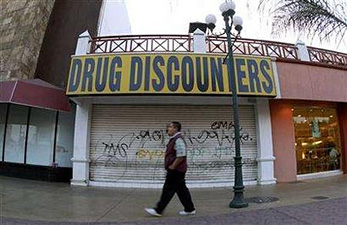
|
 |
 |
 News Around the Republic of Mexico | May 2008 News Around the Republic of Mexico | May 2008  
Drug War Shutters Businesses on Mexico Border
 Lizbeth Diaz - Reuters Lizbeth Diaz - Reuters
go to original


| | A man walks past a closed down store at the Revolucion Avenue in the border city of Tijuana May 13, 2008. (Reuters/Stringer) | | |
Tijuana, Mexico - A decade ago, economists hailed Tijuana as a place where cheap Mexican labor and U.S. financing could meet, attracting Asian firms eager to set up manufacturing plants to export to the United States.

Now, that vision is slipping away, a victim of drug violence that has been exploding this side of the U.S.-Mexico border for the past three years.

Once a freewheeling city that has served Americans cheap tequila since the U.S. prohibition era, Tijuana is at the center of a three-way drug war between rival gangs and Mexico's military. Drug-related murders are a daily occurrence.

The violence is scaring away tourists who came for everything from prostitutes and dental work to medicine. A lively artistic community is also dwindling.

While most assembly-for-export businesses, or maquiladoras, continue to operate normally, drug violence is such that they risk losing new investment to competitors like China. Other businesses are seeing their livelihoods disappear.

Just a few years ago, downtown Tijuana was bustling and the main drag, Revolution Avenue, was a busy thoroughfare. But today, it is deserted, lined with "For Sale" and "For Rent" signs.

"Many big companies are pulling out and many small companies are going bankrupt. Business isn't enough to even pay the rent for the shops and factory space," said Manuel Cesena, 57, who owns a shoe shop on Revolution Avenue.

Cesena, who has seen his sales fall fivefold since 2005, said it is crucial for him to end his day before nightfall or face being robbed or kidnapped. After 30 years in the shoe business and exporting to the United States, Cesena is considering closing for good.

DEATH TOLL RISES

More than 1,000 people have died so far this year across Mexico in battles between drug gangs and security forces, the highest murder rate since bloodshed escalated in 2006.

Tijuana is one of the most violent cities in Mexico. A group of gangs from the Pacific state of Sinaloa have set out to destroy the Tijuana's Arellano Felix cartel and to take over lucrative smuggling routes into California.

The feud between the Sinaloans and the Arellano Felix gang has not only scared away tourist dollars.

Business people face daily telephone threats of extortion. Kidnappings to finance narco gangs have jumped this year, creating a climate of fear and scaring away new investment.

"Those of us who remain only stay because we have properties we don't want to leave. We are very afraid and have to be careful not to get kidnapped," said Andres Mendez, 46, who runs an arts and crafts business in downtown Tijuana.

In Tijuana this year, drug gangs have killed more than 200 people, with cartel hitmen and soldiers spraying bullets on busy city avenues, outside shops, schools and kindergartens.

Seventeen drug hitmen were killed in a shooting in April. Even children have been murdered.

"Overcoming this insecurity is the single biggest issue for Tijuana right now," said Jorge Cruz, a business leader in the city's maquiladora industry.

In March, a plant in Tijuana assembling Panasonic electrical goods for export closed with the loss of 3,000 jobs. Plant managers declined to comment on the closure, but a city official said insecurity was a big factor.

Days before the Panasonic closure, soldiers in Tijuana made one of the biggest arms seizures in Mexico after raiding a house, uncovering grenade launchers, machine guns and other weapons encrusted with golden images of skulls.

LOST OPPORTUNITY

The exodus of businesses is painful for Tijuana, as many people had high hopes that it could move beyond its seedy roots and become a key trade, manufacturing and service center, given its proximity to the United States.

But a dozen local building companies closed over the past year, putting infrastructure development on hold. "Many were sick of the threats of kidnapping and extortion," said Sebastian Lanz, who heads a group representing local construction companies.

Tijuana hoped to position itself as a car and truck manufacturing center by attracting Chinese-owned automakers and setting up a rail link from plants to the border. But the project collapsed, largely because of insecurity.

Some business owners who have chosen to keep operating in Tijuana have moved to live over the border in San Diego and only cross back into Mexico with bodyguards.

One prominent restaurant chain owner said he had swapped his flashy sports utility vehicle for a beaten-up sedan. "I call it my antikidnap vehicle. It is the way not to attract attention," said the businessman, who asked for anonymity for the sake of his safety.

Mexico's federal government says it is doing everything it can to restore security to Tijuana and other cities in Baja California, one of Mexico's most violent states.

Since January last year, thousands of troops patrol Tijuana's streets and highways, and are engaged in a daily battle to destroy the Arellano Felix and Sinaloa drug cartels and clean up the corrupt police forces that ally with them.

But winning the fight will not be easy. As the Arellano Felix cartel weakens, the gang is increasingly relying on kidnapping and extortion.

A bid to introduce closed-circuit televisions in the city has meanwhile failed, as gangs sabotaged cameras and corrupt police switched them off to allow crimes to be committed.

(Reporting by Lizbeth Diaz; Writing by Robin Emmott; Editing by Eddie Evans) | 
 | |
 |



